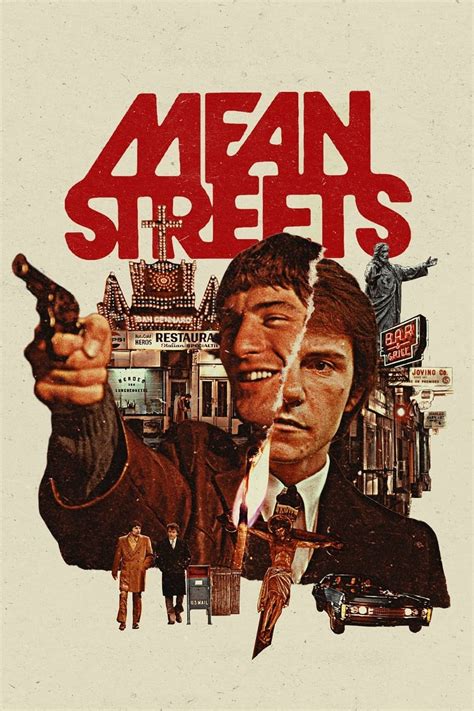Mean Streets
directed by: Martin Scorsese, year: 1973
actors: Harvey Keitel, Robert De Niro, David Proval, Amy Robinson
actors: Harvey Keitel, Robert De Niro, David Proval, Amy Robinson

Description:
Mean Streets is a gritty, realistic depiction of life in New York City's Little Italy during the early 1970s. Directed by Martin Scorsese, the film explores the intertwined lives of small-time criminals and their struggles with loyalty, ambition, and morality. The story follows Charlie, a young Italian-American man who is torn between his devout Catholic upbringing and the violent world of organized crime. Through his relationships with his reckless friend Johnny Boy and his romantic interest Teresa, Charlie navigates the challenges of his environment.Keywords:
Redemption, Loyalty, Urban Life, Violence, Catholic GuiltWhat is the Mean Streets slang?
In "Mean Streets," slang refers to the street vernacular used by the characters, predominantly in the Italian-American community of 1970s New York City. This includes terms and phrases that convey camaraderie, toughness, and the struggles of street life. The dialogue features a mix of Italian expressions, English slang, and regional accents, reflecting the cultural identity of the characters. The use of slang helps to create an authentic atmosphere, emphasizing themes of loyalty, crime, and the harsh realities of urban life.
Is Mean Streets a masterpiece?
"Mean Streets," directed by Martin Scorsese and released in 1973, is often regarded as a masterpiece of American cinema. The film is notable for its gritty portrayal of life in New York's Little Italy, exploring themes of loyalty, morality, and the complexities of urban life. Scorsese's innovative use of music, dynamic editing, and character-driven storytelling set it apart, influencing many filmmakers. Its raw performances, particularly by Harvey Keitel and Robert De Niro, contribute to its status as a seminal work in the gangster genre and a defining film of the 1970s.
Is Mean Streets based on a true story?
"Mean Streets," directed by Martin Scorsese, is not a direct true story but is heavily inspired by the director's own experiences growing up in New York City's Little Italy. The film captures the struggles of small-time gangsters and explores themes of friendship, loyalty, and morality. While the characters and events are fictional, they reflect the realities of life in the neighborhood during the 1970s, blending Scorsese's personal narrative with the broader cultural and social issues of the time.
What is the meaning behind Mean Streets?
"Mean Streets," directed by Martin Scorsese, explores themes of morality, loyalty, and the struggles of life in an Italian-American neighborhood in New York City. The film follows Charlie, a small-time gangster, as he navigates the complexities of his relationships and the criminal underworld. It reflects the conflict between personal morals and the harsh realities of street life. The title symbolizes the tough environment and the characters' attempts to find meaning and redemption amidst violence and chaos. Ultimately, it portrays the challenges of living an honorable life in a corrupt world.
Explore More Categories:
History Sketch Comedy Religion Gangster Drama Travel Corpse Antics Space Opera Human Rights Emotional Illusion Experiment Corporate Basketball Interviews Quarter Life Crisis Performance Disconnection Wildlife Entrepreneurship Time Travel Financial Crisis Herbert West Transformation Knighthood Tradition